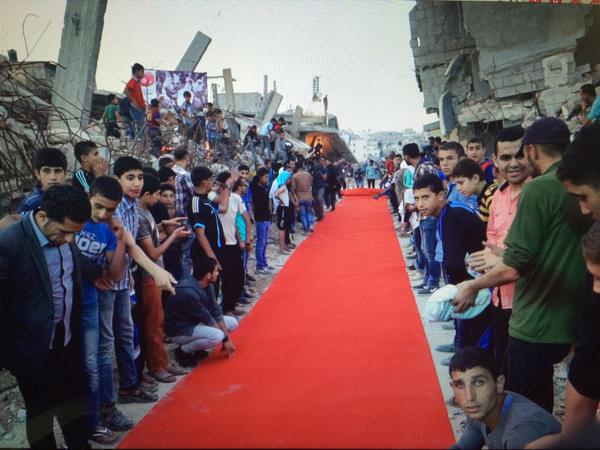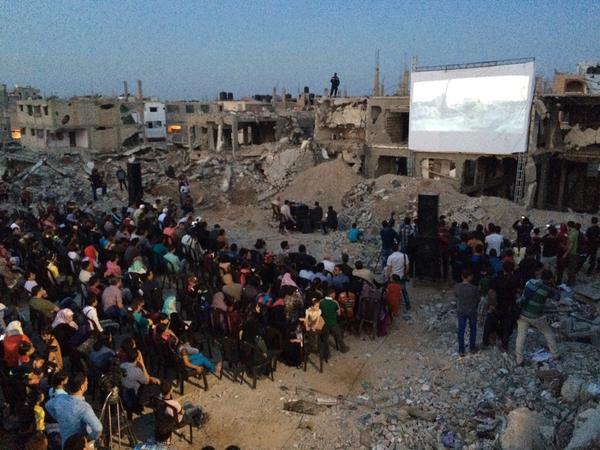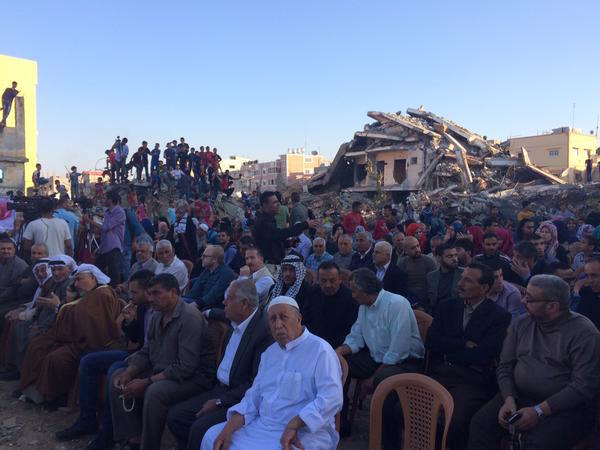The human rights film festival sends a message that Gaza is not just a strip of flattened homes, poverty and militants, as the media tends to portray it, says one of the organizers. ‘The people of Gaza are human beings, who love life, who seek peace, and who want to go to the movies, to live normal lives.’
By Avi Blecherman

While Israeli entertainment reporters have been busy covering the DocAviv documentary film festival in Tel Aviv in recent days, but nearby, another rather exceptional film festival came to a close Thursday evening in the Shujaiyeh neighborhood of Gaza City — a festival dedicated entirely to films about human rights.
Shujaiyeh, where the festival was held, was the scene of some of the heaviest fighting and destruction during last summer’s Gaza war, in which Israel flattened large swaths of the crowded neighborhood. Some 100 Palestinians and 13 Israelis were killed there on July 20, 2014. Many of those killed and injured were women and children.
I spoke with festival organizer Saud Aburamadan, a veteran journalist and resident of Gaza on Thursday — in Hebrew.
Saud, tell me a little about the festival, please.
This is the first film festival held in Gaza, ever. A group of filmmakers and journalists in Gaza, who aren’t affiliated with any [political] organization organized the unusual festival, out of the belief that everyone deserves a bit of dignity and quiet.
The director of the festival is Palestinian filmmaker Khalil al-Muzain, and the Jordanian Karma Film Festival sponsored us. We have films from Syria, Iraq, Egypt, Jordan, Russia, and other countries. There are 180 films, 28 of which were selected by the professional committee to be screened over the past three days.
How did local residents react to this initiative?
Look, part of our complicated reality here is that there hasn’t been even one movie theater in all of Gaza since the First Intifada. I know Gazans in their twenties, my children for example, who have never been in a movie theater. We live with the conflict and under siege, it’s a hard life. People are preoccupied with survival, how to feed their families, how to find work, how to protect their families and their children during wars.
When we were looking for locations to screen the films we arrived in Shujaiyeh in eastern Gaza City, a large part of which was turned to rubble. We stood there next to the destroyed mosque, surrounded by destroyed homes in every direction, and became clear that it was the right place to hold a film festival focused on human rights.
Do you feel that this festival is also sending a message to the outside world?
Definitely. The festival reminds the world at large, the Middle East and Israel, that the people of Gaza have been living under siege for more than eight years and that it needs to be ended. We are also trying to remind the world that spoke about sending aid to rebuild Gaza, that if it is serious about its promises, then this is the time the time to act.
People here live in an impossible reality. And you know what? This festival also sends a message to Hamas and Fatah, that the internal conflicts between them are also destroying our lives here in Gaza.
But no less important is the message that Gaza is not just a strip of flattened homes, poverty and militants who fire missiles at Israel, or people who just live to die, as the media tends to portray us. It’s important to us that the world see that is not true. The people of Gaza are human beings, who love life, who seek peace, who want to go to the movies, to live normal lives.

How did you manage to put on an event like this in a destroyed neighborhood, without any infrastructure?
It wouldn’t have happened without the help of the neighborhood’s residents themselves. They an integral part of the crew that put this festival on. We asked them if they wanted to help and everyone showed up — children, women, men, the elderly and the young. Everyone came to help — to clear rubble and prepare the area, one person brought water, one person brought coffee, they helped build the stage, to hang the signs, to set up the giant screen, a movie theater-sized screen that we built on the wall of a destroyed home.
The image of the red carpet with destroyed homes on both sides is spine-tingling. Who walked down it?
Well, you can’t have a film festival without a red carpet. We took that symbol and made it work for the our reality here in Gaza. For us, red is first and foremost the the color of so much blood that was spilled here this summer. The blood of women, men and children.
There was a family in Shujaiyeh, the al-Hilu family, which lost 11 people in a bombing, most of them women and children. Usually the people walking down the red carpet at a film festival are VIPs. Here, we laid down the 70-meter red carpet on one of the main roads that leads to where we screened the films, a road that has nothing but destroyed homes. We invited all of the residents to walk down the red carpet to the premiere. It was our way of saying that each and every one of them is important.

How did the audience react to the festival?
On opening night hundreds of neighborhood residents showed up, along with others from other parts of Gaza. It was a very happy and celebratory evening with speeches and musical performances and children singing. We screened two films that night: one by a Gazan filmmaker and the second one from the West Bank. They both dealt with human rights.
It was 9:30 p.m. and the place was full of light. You have to understand, Shujaiyeh has lived in darkness for the past eight months. The infrastructure was destroyed. People have been living in darkness, in candle light. This festival brought normalcy back for a moment. It brought daylight. People came up to me and said: ‘Saud, this might be the first time that we’ve felt like we aren’t living in Gaza. We’re going to the movies, it’s great!’ If you ask me, something like this can be more important than food, and certainly more important than politics around here.
Said, do you have something you want to say to our readers in Israel?
You know, I’ve been a journalist for 28 years, writing for international outlets. I’ve been interviewed by Israeli news outlets and I have a lot of journalist friends. It’s a shame that Israeli news outlets ignore events like this and don’t present them to the Israeli public. I know that you have a film festival in Tel Aviv this week. We have one in Gaza, and they couldn’t be further apart.
I wish that one day soon there will be peace and we will be able to come and participate in your festival and you can come to Gaza once again and participate in our festival. We are all human beings. It’s a shame that the years and days are filled with pain and sorrow. As a resident of Gaza, I am sorry about all of this violence and war. We are all human beings and we need to enjoy life and not kill and be killed.
Avi Blecherman is an Israeli activist and journalist. This article was first published in Hebrew on Local Call, where he is a blogger. Read it here.

